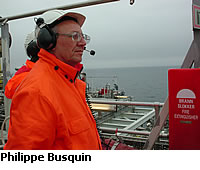Busquin gets close up view of Norwegian research
European Research Commissioner Philippe Busquin received some frank feedback on the European Commission's proposals for the Sixth Framework programme, while taking a close look at the developments in Norwegian research and development (R&D), during his visit to Norway on 28 and 29 June. The Commissioner was presented with the views of representatives of the Norwegian government, the country's four major universities (Oslo, Bergen, Trondheim and Tromsö), the country's research council and representatives of the Norwegian private sector. He was given a clear message that further impetus needs to be given to marine research in the European Union's next Framework programme (FP6), an area in which Norway has both excellent skills and facilities, but which also holds a great deal of importance for the country as marine and fishing resources account for the country's second largest source of revenue (after oil). This also ties in with the Norwegian desire to see more attention given to energy and climate change issues in FP6, which is again an area in which Norway has a lot of expertise to offer. Finally, the Norwegian representatives highlighted that there was insufficient attention given to the humanities in the Framework proposals, another area which they would like to see addressed. In addition to these subject recommendations, Commissioner Busquin was also told that a strengthening of the INCO programme would be desirable in FP6. Commissioner Busquin listened to each of the representations (which will be covered in more detail in forthcoming CORDIS News articles) and reinforced the importance of Norwegian research to the European initiatives. 'I would particularly like to highlight the top position of Norway in the field of global change, particularly with respect to the polar area. Norway has a unique competence in research in Europe for the treatment of carbon sequestration in oceanic layers,' he said. He continued, saying that its geographic position made it an important partner in areas such as climate change, nuclear safety and maritime traffic, amongst others. Certain research institutes which have played a full part in the current Framework programme were singled out for a specific mention by the Commissioner, including the Norwegian institute for marine science in Bergen, the Nansen institute for teledetection, Tromsö's institute for air research and the Norwegian institute for water research (NIVA). Work of these and other research bodies in Norway puts Norway in a good position for the next Framework programme and notably with respect to the priority 'sustainable development and global change', something which can benefit both Norway and the EU, said the Commissioner. Further integration of Norwegian research is expected in the benchmarking of R&D efforts, a collection of some 15 factors which the Commissioner said he would like to see Norway be included in. A similar exercise on Norway's own version of eEurope, entitled eNorway, has already begun. But the Commissioner made clear that one of the most important elements in making the proposed European research area (ERA) work, mobility, will also be essential to ensuring that countries like Norway play a key role in opening up European research. 'Mobility is one of the most important problems for industry and research in Europe. That is why the level of funding dedicated to it has doubled from 900 million euro in the Fifth Framework programme (FP5) to 1.8 billion for FP6,' he said. Following the discussion in Bergen, Mr Busquin accompanied Norwegian minister for trade and industry, Mrs Grete Knudsen, on a trip to a Norsk Hydro oil rig in the North Sea, where, as well as seeing how the rig operated, he heard further details about energy research.



